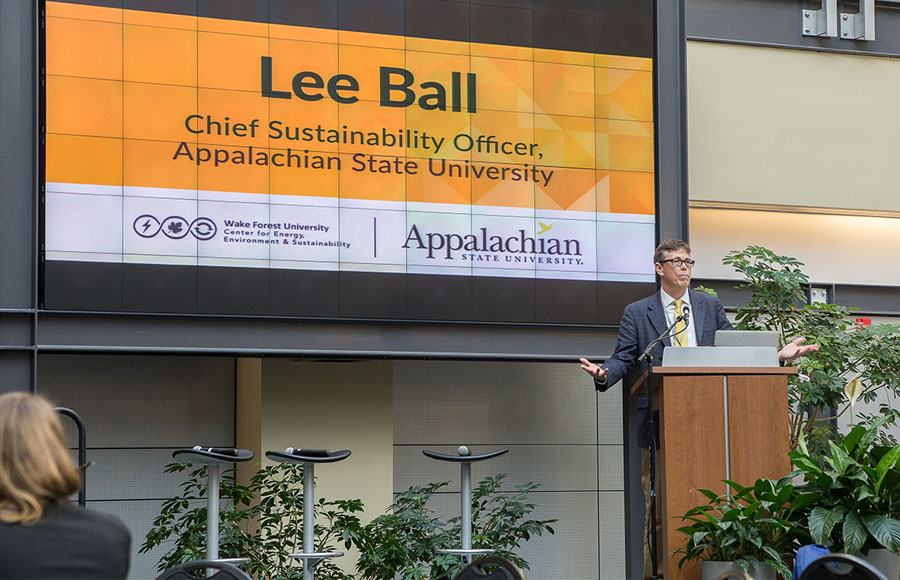BOONE, N.C. — The seventh annual Appalachian Energy Summit midyear meeting, which was held at the Wake Forest Biotech Place Conference Center this month in Winston-Salem, brought together students, faculty and leaders in academia and business to exchange ideas and share best practices in support of a clean energy economy.
“It’s important to convene,” said Dr. Lee Ball, chief sustainability officer for Appalachian State University. “We come to this from different places, different perspectives, but it’s important that we share.”
The first summit was held on Appalachian’s campus in the summer of 2012. The goal for the summit was to start a national, transformative effort across higher education and was embraced as a University of North Carolina System-wide initiative with the following objectives:
- Educate students to be leaders of tomorrow.
- Reduce and stabilize the UNC System’s average annual energy expenditures.
- Transform and stimulate the North Carolina economy.
- Position our colleagues in the UNC System and private universities as national leaders.
- Create a culture of environmental and economic sustainability.
As the initiator and host of the summit, Appalachian has assumed a leadership role in reducing the UNC System’s energy costs. Since 2012, the summit has provided a platform through which UNC campuses together with industry partners have avoided more than $499 million in utility costs, representing almost 9 billion pounds of carbon dioxide emissions.
“The Appalachian Energy Summit midyear meeting allows the seven different working groups the ability to meet face to face twice a year,” Ball said. “Most importantly, the meeting is a chance for us to connect with our peers in order to share best practices, frustrations and accomplishments.”
Dr. Tammy Kowalczyk, professor of accounting in Appalachian’s Walker College of Business, updated attendees at the meeting on her efforts to create an academic learning community online. She will be developing a site that allows professors at Appalachian to share information about sustainability and will open the site to those on other campuses. If they’re interested in participating, she said, the site might allow faculty to collaborate on research projects or exchange ideas about how to infuse sustainability into different disciplines.
Three presenters from Wake Forest University also spoke at the summit:
- Dr. Miles Silman, the Andrew Sabin Family Foundation Professor of Conservation Biology and director of the Center for Energy, Environment and Sustainability, on “Real World Sustainability.”
- Mike Draughn, director of maintenance and utilities services, on “Building Renewal and Efficiency at Wake Forest University.”
- Stan Meiburg, director of graduate programs in sustainability at Wake Forest, who joined the university last year after 39 years with the Environmental Protection Agency, on the growth of the university’s sustainability programs.
Breakout sessions covered topics such as integrating sustainability into the academic curriculum, campus-based energy efficiency and high-performance campus design. A panel on House Bill 589, which deals with energy policy, discussed the regulatory landscape for renewable energy in North Carolina.
Ball closed the midyear meeting by reminding the audience to attend the next summit, which will be held July 30-Aug. 1 at Appalachian.
“The theme for the summit, Leadership for Good, has a lot to do with leading with integrity,” Ball said.
About Sustainability and Energy Management at App State
Appalachian State University’s leadership in sustainability is known nationally. The university’s holistic, three-branched approach considers sustainability economically, environmentally and equitably in relationship to the planet’s co-inhabitants. The university is an active steward of the state’s interconnected financial, cultural and natural resources and challenges students and others think critically and creatively about sustainability and what it means from the smallest individual action to the most broad-based applications. The university offers both undergraduate and graduate academic degree programs that focus on sustainability. In addition, 100 percent of Appalachian’s academic departments offer at least one sustainability course or course that includes sustainability, and all students graduate from programs that have adopted at least one sustainability learning outcome. Learn more at https://appstate.edu/sustainability.
About the Walker College of Business
The Walker College of Business at Appalachian State University delivers transformational educational experiences that prepare and inspire students to be ethical, innovative and engaged business leaders who positively impact their communities, both locally and globally. The college places emphasis on international experiences, sustainable business practices, entrepreneurial programs and real-world applications with industry. Enrolling nearly 5,000 students, including more than 4,500 undergraduates across 11 majors, the Walker College of Business has the highest full-time undergraduate enrollment in the University of North Carolina System. App State’s Walker College is accredited by AACSB International — the premier global accrediting body for business schools. Learn more at https://business.appstate.edu.
About Appalachian State University
As a premier public institution, Appalachian State University prepares students to lead purposeful lives. App State is one of 17 campuses in the University of North Carolina System, with a national reputation for innovative teaching and opening access to a high-quality, cost-effective education. The university enrolls more than 21,000 students, has a low student-to-faculty ratio and offers more than 150 undergraduate and 80 graduate majors at its Boone and Hickory campuses and through App State Online. Learn more at https://www.appstate.edu.
What do you think?
Share your feedback on this story.













